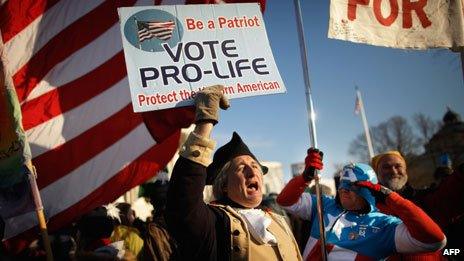Mississippi voters reject life at conception amendment
- Published

Mississippi residents have rejected a proposed constitutional amendment to define a fertilized human egg as a person.
The measure would have conferred rights on an embryo from the moment of conception, effectively outlawing abortion, even in rape or incest cases.
More than 55% of voters dismissed the so-called personhood initiative.
Mississippi already has tough abortion regulations and a single clinic that performs the procedure.
Correspondents say that even if the amendment had passed it would have faced legal challenges, as it contradicts the right to abortion established by the Roe v Wade Supreme Court ruling of 1973.
Voters on Tuesday were asked: "Should the term 'person' be defined to include every human being from the moment of fertilization, cloning, or the functional equivalent thereof?"
Backers of the amendment to the state's constitution had collected more than 100,000 signatures from registered voters to introduce it to the ballot.
The amendment could have also led to the banning of some birth control methods in Mississippi.
It had attracted strong support in the conservative and religious state.
A poll taken before the vote found that 45% of voters in Mississippi backed the measure, 44% were against, and 11% undecided.
The state's Democratic and Republican candidates for governor, who also ran for election on Tuesday, both came out in favour of the amendment.
Voters elected Republican Phil Bryant to succeed outgoing Governor Haley Barbour. Mr Bryant had been quoted as telling supporters that "Satan wins" if the personhood measure failed.
But opponents said that there could have been wide-ranging legal repercussions if an embryo was granted equal rights to its mother.
Personhood campaigners also hope to put the question to voters in the US states of Ohio, Florida, and South Dakota in 2012.
But similar measures have been rejected twice by wide margins by voters in Colorado in 2008 and 2010.
- Published8 February 2011